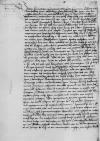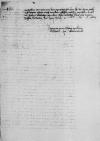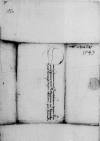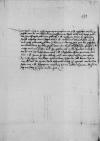Denn ersamenn unnd namhaftigenn herren ⌊burgermeisterenn unnd rathmannen der koniglichen stadt Dantzigk⌋, / unsern besundern, gutten freunden
Wir haben aus dem negsten ⌊⌋ an uns / des grosmechtigen herren ⌊marienburgischenn woÿwodenn⌋ etc. vorstandenn, / der uns ouch solchs nicht ane vordrisslickheit angetzeigt, / wie Euere Erbarkeit von wegen der funff lundischen tucher die der edell, erenvheste her ⌊Fabian Czeme⌋, colmischer underkemerer, an ⌊junger koniglicher maiestet⌋ hoff / dem herren ⌊hoffemeister⌋ und ⌊secretario⌋ / in nhamen der herren ⌊rethe dieser lande⌋ hett sollen zuvorehren mit nemen, / wie es auf negster ⌊thagfart⌋ von Euer Erbarkeit geschickten angenomen und zugesagt, / sich beschweren / und solche funf tucher vor die vierhundert margk, / die Euer Erbarkeit neben den andern zwen ⌊stadten⌋ / den dreien hern bottschaftern zugeben schuldig, / vorhalten / unnd dermassen aus dem alten gebrauch, / der hie im lande zu jeder zeit, / auch bei frischem gedenckenn, / gewönlich, / sich wollen austziehenn, / welchs uns seltzam ansicht, / weil wir mit unserm ⌊wirdigen capitel⌋ zu solcher bottschafft, / dabey wir niemandts von den unsen gehabt, / sechs hundert marck gelegt, / das hie zuvor im ⌊lande⌋ nie gescheen / und die gewonheit ubertrift. / Wo dis vor nhemen aus wil, / wan der gemeine nutz ⌊dieser lande⌋ der gestalt soll vorlassen werden, / haben Euer Erbarkeit als die weit vorstenndigen wol zu ermessen. / Es ist auch Euer Erbarkeit ane zweivel durch ihre geschickten dazumal angetzeigt, / wie sie auf negster zu ⌊Marienburg⌋ ⌊thagfart⌋ / mit den ⌊hern rethenn⌋ / vonn wegen der vierhundert margk gehandelt, / das vor solche summa zugelassen wurde, / die funf tucher / dem obgemeltenn hern ⌊culmischem underkemerer⌋ zuuberantwurten, / worauf wir auch ( nicht anders wissende ) beiden hern ⌊junger koniglicher maiestet⌋ ⌊hoffmeister⌋ und ⌊secretario⌋ ⌊⌋, / das solch gewandt von den ⌊hern rethen⌋ ihnen sold zukomen, / bittende dieser ⌊lande⌋ anliegen in gutter acht zuhabenn / etc., welchs viel anders gefaren, / des wir uns auf Euer Erbarkeit geschickten zusage / nicht hetten vorhoffet / und mussen uns unsers schreibens entsehen. / Wie hernachmals hieraus gemelte beide ⌊herrn⌋ / ⌊dis lands⌋ sachenn bei ⌊junger koniglicher maiestet⌋ / werden zugethann und gewogenn sein, / ist leichtlich abtzunemen. / Hierumb ist an Euer Erbarkeit unser freuntlich bitt und ermanen, / wie auch, / unsers achtens, / von dem grosmechtigen hern ⌊marienburgischem woywoden⌋ wirt gescheen, / die wolten dartzu gedencken, / das aus dem alten gebrauche nicht wurde getreten unnd das vor die vierhundert margk, / darzu es Euer Erbarkeit gebassenn, die funf tucher mit den ersten an den hern ⌊culmischen underkemerer⌋ gen der ⌊Wilden⌋ geschickt wurdenn, / damit wir die ⌊beiden herrenn⌋, / die bei ⌊junger koniglicher maiestet⌋ / in den vornembsten ansehen sein, / ⌊diesem lande⌋ vorhielden, / wie wir uns dan gentzlich zu Euer Erbarkeit, / die ihnen selbst / und diesem lande nicht werden abstehen, / wollen vorlassen / unnd die hiemit gotlichen gnaden thun bevelhen. /
Wir haben auch in negst vorgangner ⌊thagfart⌋ mit Euer Erbarkeit geschickten beredunge gehabt, / was ⌊die von Graudentz⌋ angehet, / die der stadt brief und siegel haben, / das zwe besiegelte secke mit gelde / bei Euer Erbarkeit vorfharen, / etwan zu getrawer handt abgelegt, / damit solcher brief Euer Erbarkeit widerumb uberantwurt wurde / und nicht mutwilligen leuten zukueme etc. derwegen wir mit den geschickten von Graudentz handel gehabt, / inen den brief abczukoüffen, / gleich ob Euer Erbarkeit nichts darumb wusten / und ihn geboten bis in die hundert margk / etc. das sie mit sich / dergleichenn auch Euer Erbarkeit geschickten / heim genomen. / Was nun Euer Erbarkeit hierin zu thun bedacht, / wold uns lassen wissen. / Wir wolten ja nicht gerne, / das solcher brief andern zuhanden sold komen, / daraus Euer Erbarkeit und der gutten ⌊stadt⌋ beschwerde mocht zu getriben werden. / Das haben wir Euer Erbarkeit zugethaner meÿnung hiemit wollen erinnern, / der zuvorsicht, / uns solchs zu gutte werden halten etc.



